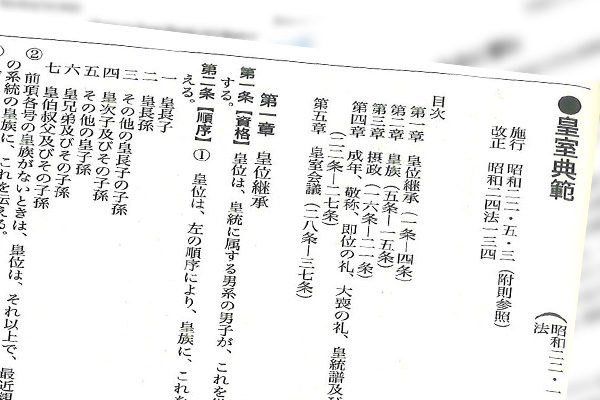This is likely to be an extremely important year for Japan as a constitutional monarchy.
If the current Imperial House Act is maintained, the number of imperial family members will decrease sharply. Against the backdrop of such a sense of crisis, the then Yoshihide Suga administration in 2021 established a panel of experts on relevant issues, such as challenges to ensure a stable succession to the imperial throne and the creation of female imperial branches. The panel compiled a report in January 2022. In this report, the government took seriously the precedent that successive imperial thrones have been inherited through the male line without exception and proposed the following three reform measures, stating that securing the number of imperial family members is an urgent challenge.
(1) Imperial and other princesses will retain the status of imperial family member after marriage.
(2) A ban on adoption for the imperial family shall be lifted to allow imperial male-line males to be imperial family members.
(3) Imperial male-line males shall be designated as imperial family members directly by law.
The government thus proposed essentially two measures: one for allowing female imperial family members to retain the status of imperial family member after marriage and the other for allowing imperial male-line males to become imperial family members. Both measures will require some legislations. The imperial male-line males refer to male-line males who belong to 11 imperial family branches that had been imperial family members until October 1947 under the current constitution – Fushimi-no-miya, Kanin-no-miya, Yamashina-no-miya, Kitashirakawa-no-miya, Nashimoto-no-miya, Kuni-no-miya, Kaya-no-miya, Higashifushimi-no-miya, Takeda-no-miya, Asaka-no-miya, and Higashikuni-no-miya.
A quick response from Japan Innovation Party
The House of Representatives speaker and the House of Councilors president asked political parties to present their opinions on the government proposal. The Japan Innovation Party was the first to respond. In April 2022, the party submitted a written opinion that expressed concern that measure (1) might expand the eligibility for succession to the imperial throne to female lines, while highly appreciating measures (2) and (3).
In consideration of other political parties’ inaction, House of Representatives Speaker Fukushiro Nukaga informed each party of his intention to set up a forum for discussion on the matter in the legislature during the ordinary Diet session in 2024 (that is the current session) and requested each party to compile opinions soon.
Prime Minister Fumio Kishida in his policy speech on January 30 stated, “I look forward to the Diet engaging in vigorous discussions so that the ‘consensus of the legislature’ can be compiled as soon as possible.” On March 15, the government announced that Shigetaka Yamasaki, a former Cabinet Office vice minister who had been the special adviser to the Cabinet in charge of the imperial family system and managed the abdication of Emperor Akihito and the ceremonies for the enthronement of current Emperor Naruhito during the second Abe administration, was reappointed as director-general for liaison and coordination on the imperial family system. It thus made arrangements for reforming the imperial family system with emphasis on traditions and precedents.
Most political parties accepted government proposal
Earlier this year, the Party to Protect the People from NHK, the Democratic Party for the People, the Yushi no Kai, and the Komeito party submitted their respective written opinions that almost endorsed the government proposal. Meanwhile, the Constitutional Democratic Party of Japan, which had strongly advocated the so-called “female imperial branch” but not a few of which strongly support the government-proposed measures (2) and (3), gave up on compiling a uniform opinion and submitted a “discussion summary” that includes both arguments. Therefore, most of the ruling and opposition parties endorsed or tolerated the government proposal.
I welcome the demonstration of sensible attitude to refrain from using the imperial family as a tool for political strife and hope that the imperial family system reform based on the traditions and precedents will progress smoothly.
Michio Ezaki is a member of the Planning Committee at the Japan Institute for National Fundamentals and a guest professor at Reitaku University.


